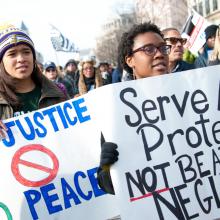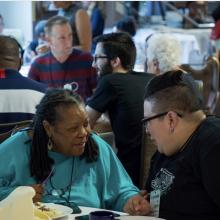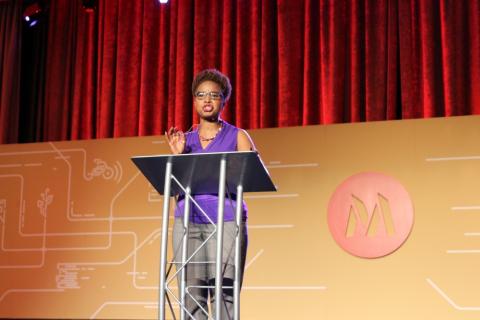Summit
President Joe Biden will meet with Pope Francis on Oct. 29 before attending a two-day summit of G-20 leaders in Rome where he hopes to reach agreement on a Global Minimum Tax of 15 percent, White House officials said on Thursday.
On the second foreign trip of his presidency, Biden will then attend the U.N. climate conference known as COP26 in Glasgow, Scotland, from Nov. 1-2 and announce “key actions” on the conference's top themes, including goals for fighting climate change and forest and land use, one White House official told Reuters.
That opportunity to root ourselves in faith and community is what The Summit is all about, this year and every year. It’s why we need you to join us, and to tell us which other leaders need to be there, too.
As one who enjoys the benefits of privilege in today's world, I felt it important to submit my own sense of what is just and right to other perspectives, especially other perspectives that are informed by biblical witness and the Christian gospel. The 2017 Summit represented that sort of challenge for me.
These are the times in which we now live. The turbulence of this year has left many of us feeling buffeted by constant storms in politics, society, and nature. Amid this daily chaos, fear, and pain, one thing is clear: The role of faith leaders across society is more important than ever. Our call and our ministry requires us to stay radically rooted.

Image via Rena Schild/Shutterstock.com
There is change for racial justice and equity in the air in Boston, to an extent that I previously only hoped for but could not heretofore have envisioned. And as I look ahead to attending Sojourners’ upcoming leadership Summit, which focuses on the intersections and implications of race across numerous justice issues, I expect and pray for change to be in the air in D.C., and that the same winds may fill our sails in June.
Over 400 participants from all continents (barring Antarctica) gathered on Messiah College’s campus in Harrisburg, Pa., to further their understanding of Anabaptist teachings while exploring what it means to be a part of the global church during the 2015 Global Youth Summit, under the theme, “Called to Share: My Gifts, Our Gifts.” Participants engaged in deep learning through workshops led by professors and historians, connected to their history through historical Mennonite tours all over Pennsylvania where they visited museums and Mennonite churches and met Amish families, and tapped into their musical side with globally-infused worship.
My role as the North America representative for the summit (which coincided with the 2015 Mennonite World Conference) meant meeting with delegates on an individual basis — the delegates being representatives from global conferences. It meant hearing stories about home churches and struggles with governments, and discussions about theologically Anabaptist responses to violence and change in all four corners of the earth.
And, of course, it meant witnessing people randomly break out in song and dance. Both a boisterous drum circle and competitive games of Dutch Blitz lasted well into the night.
I think we’ve all been there: physically tired, emotionally battered, and spiritual frustrated. This combination of conditions often lead to the thought of wondering if anybody cares — not just for you, but for the things that you are passionate about. You may feel like the last person standing, the only one who has a sincere zeal for what you’ve been called to address. ...
The Summit provided a unique setting that brought together leaders from the business and urban communities, others from the front lines of inner city racial inequality protests, and rural communities of both national and international descent.
The work we do in the nonprofit sector is complex and multifaceted. Often we find ourselves compartmentalizing our identities based on the work we’re currently doing. Am I a woman, an organizer, an African American, a facilitator, a Roman Catholic, a philanthropist, or a manager? And which of those is most important to the success of my work?
The Summit, hosted by Sojourners, is a unique opportunity to rise above some of these identity markers and practice being as holistically authentic as we can. Over 300 leaders committed to changing the world through faith and justice gathered in June in Washington, D.C., for a three-and-a-half day exploration of the particular ways that faith leaders impact a range of social justice issues. NCRP facilitated a private conversation for nearly 2 dozen philanthropic leaders who attended The Summit to consider the role that philanthropy plays in this process.
Much more than an event or a conference, The Summit was the growing edge of the beloved community — a gathering of emerging leaders with deep reach into neighborhoods and communities that are outcast but vibrant, marginalized but standing tall. It was creative and radically inclusive, bringing together people with very different experiences in the struggle for a more just and peaceful world.
To be included as an elder for such an event was a humbling and lovely experience — even more so to share that experience with such wise and faithful disciples as C.T. Vivian and Eliseo Medina, Heidi Neumark and Terry LeBlanc, Katherine Marshall and Roy Sano. I gained much more from each conversation than I could possibly have given!
Editor’s Note: We at Sojourners thought it would be nice to share first-hand reflections of this year’s leadership Summit: World Change Through Faith & Justice from participants to give a little glimpse into the impact and experience. Our first post comes from Rev. Louise Howlett of Middleton, Del., who was a first-time attendee nominated by fellow sojourner and changemaker Louise Coggins, with whom she serves on the board of VISIONS-Inc.
My first Sojourners Summit was a powerful experience. I was not sure if I belonged there at first, and expected to be intimidated by the fervor and zeal of other participants. My work is on a small scale and is often more about personal transformation and interpersonal change than large-scale systemic change.
Yet I found the stories told from the podium, the sharing at the tables, the teaching in the workshops and panels, and the music and visual arts in response to be both inviting and empowering. Being with people of faith from all different backgrounds and faith groups bonding in prayer and care for justice — and sharing in fighting racism, war, poverty, and systems of oppression — felt hopeful.
Sometimes care for justice feels lonely and hard, like swimming upstream. But being in a gathering like the Sojourners Summit reminded me that hundreds and thousands of people of faith are out in their communities praying and working together to make change.

Image via nobeastsofierce/Shutterstock
Week after week, we can take on the biggest issues we face as a society — from continuing racism, mass incarceration, inequality, and poverty to gender violence and human trafficking, climate change, ISIS — and just try to be hopeful.
Or we can start by going deeper, to a more foundational and spiritual understanding of hope — rooted in our identity as the children of God, made in the image of God, as the only thing that will see us through times like this.
I believe we should start there. Because the biggest problem we face — the biggest enemy at the heart of many of the issues we must address — is hopelessness.
And perhaps the most important thing the world needs from the faith community is today is hope.
IN JUNE, SOJOURNERS decided to take part in a little experiment. What would happen if 300 faith and social justice leaders gathered together for a few days to discuss some of the most pressing issues of our time? Our first ever Summit, under the leadership of chief strategy officer Timothy King, had as its tagline: “World Change through Faith and Justice.” Only time will tell how this experiment will play out in the long run, but in the short term I would consider it a great success.
Held over four days in June at Georgetown University in Washington, D.C., the conference brought together 296 leaders from churches, faith-based organizations, NGOs, media outlets, business, and politics. Fifty-three percent of attendees were female, and half were people of color; they were drawn from a wide range of Christian and other religious and spiritual backgrounds.
On the first night, when I saw who was there, I knew the Summit was going to be a powerful and wonderful time. Some participants were local Washingtonians. Others came from as far away as Ethiopia to attend. The group included icons of the social justice movement such as Ron Sider, Marie Dennis, Yvonne Delk, Otis Moss Jr., and Tony Campolo as well as newer leaders such as Otis Moss III, Rachel Marie Stone, and Daniel Varghese, a Georgetown undergraduate who celebrated the Summit’s “radical egalitarianism.” As Timothy King mentioned in our opening session, the group looked a lot like the kingdom of God!
Religious leaders from across Africa and England came together Wednesday to discuss the role clergy should play in preventing and responding to sexual violence.
The panel was part of the three-day Global Summit to End Sexual Violence in Conflict co-chaired by Angelina Jolie, the special envoy for the U.N. high commissioner for refugees. Jolie made an unannounced appearance before the event, causing attendance to surge and preventing several dozen participants from entering the crowded conference room.
In a pre-recorded video message, Archbishop of Canterbury Justin Welby started the session by describing some of the positive developments he observed firsthand on a recent trip to the Democratic Republic of Congo.
“Historically there has been a culture of impunity,” he said. “Faith leaders are challenging that culture fiercely and saying that rape and sexual violence in war is absolutely unacceptable and will result in consequences.”
VATICAN CITY — Ten years after the clergy sexual abuse scandal erupted in the United States, Catholic bishops from all over the world will meet next week at a Vatican summit aimed at preventing abuse and protecting children.
The conference, "Towards Healing and Renewal," will be held on Feb. 6-9 and is organized by the Jesuit-run Gregorian University in Rome.
The Vatican's top spokesman, the Rev. Federico Lombardi, told reporters on Friday (Feb. 3) that the summit enjoys the "full support and participation" of the Vatican's highest offices, but Pope Benedict XVI is not expected to attend.
Monsignor Charles Scicluna, the Vatican's chief abuse prosecutor, said the protection of children must become "a permanent principle and concern" in every decision of the church.
"There cannot be a distinction between the good of the church and the protection of youth," he said Friday.
Last weekend, I had the privilege of spending some time at the End Genocide Action Summit, which brought people from all over the world to Washington, D.C., to learn about and fight against genocide, particularly the ongoing genocide being waged by Omar al-Bashir against the people of Darfur, Sudan.











